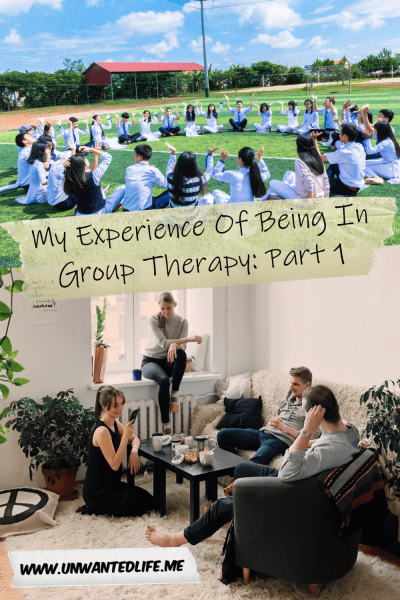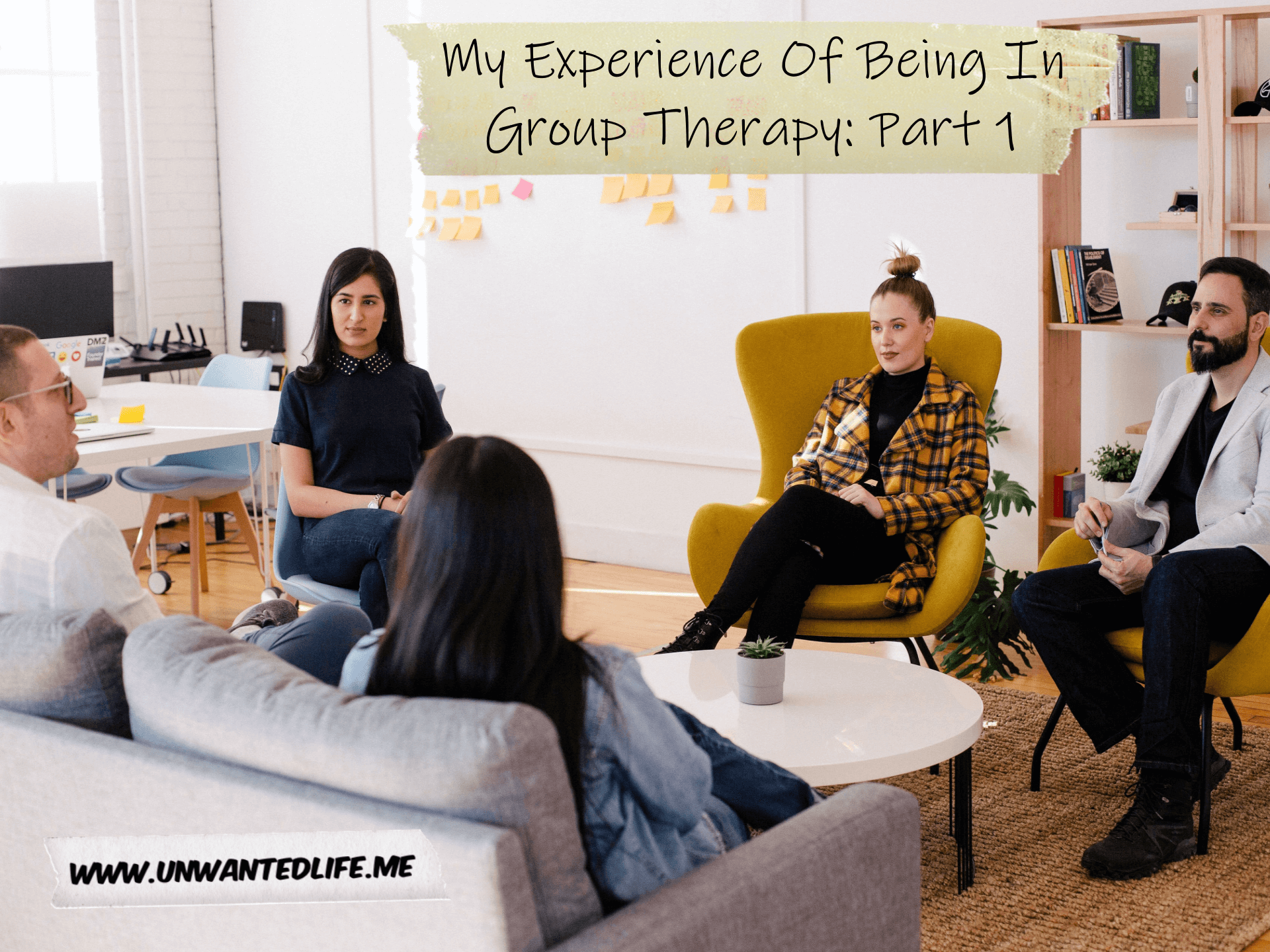After my experience with Schema Therapy (My Experience Of Being In One-To-One Schema Therapy) offered group therapy. This would become my first experience of being in group therapy as a client. Before that, I’d only ever been a facilitator of group workshops through my volunteer work.
I reached out to my Mental Health Trust, again, in the hopes of getting support for a different aspect of my mental health problems. Instead of trying to get help for my anxiety disorders like last time, I sort help for my borderline personality disorder (BPD). This was because I’d made a lot of progress on my own with my anxiety disorders, no thanks to my one-to-one therapy (My Experience With One-To-One Therapy).
Relationships
I wanted to do something about the problems I have with relationships, whereby I was unable to be in a relationship longer than two months. Every time I was in a relationship I would be unable to stand the thought or touch of the person I was seeing. But for some reason, this issue would disappear after I broke up with them.
At this point, I’d only had one relationship that had lasted longer than 2-3 months. But even with my current partner, which is now my longest relationship, I’ve had to contend with this problem of being disgusted by their touch. It’s also not an easy discussion to have with someone when trying to explain that the thought of them touching you makes your skin crawl. No one wants to hear that their mere touch repulses you when you’re meant to love each other.
This response I keep having, which seems to come from nowhere, is a horribly lonely issue (for years I chose to avoid relationships so I could avoid this problem). An issue that is made worse by trying to explain it to someone who loves you.
It’s my guess that I have this extreme reaction due to my attachment issues. Because I was bullied a lot and distrusted my peers during my childhood development years, coupled with the emotional neglect from my mum while I was suffering and becoming suicidal, left me with this legacy. The gift that keeps on giving: my childhood.
Anyway, I was offered a place in a group for BPD called ‘Mentalisation’ and enrolled on a trial version of the group to see if I’d like it. This trial of group therapy was a six-week course. Spoiler, I didn’t like it.

Mentalisation Group Therapy
I tried the mentalisation group because it was the only treatment option they would offer me: I’m willing to try anything when it comes to treatment before I make a judgement about it.
Clients are meant to be involved in choosing their treatments, but you can’t make a treatment choice if theirs only one option. This would become a pattern with my Mental Health Trust and is against the spirit of the NICE guidelines.
The mentalisation group really didn’t work out for me. I just didn’t click with it at all. This resulted in me feeling very frustrated, bored, and resentful for being there. Whenever the group was involved in talking about something, I’d just sit there with my mind entertaining me with random music, noises, and tunes. At the same time, time seemed to have stopped moving forward. It was an agony of boredom, frustration, and resentment that seemed to last forever. I couldn’t take it.
To make matters worse, the art part of the group made these feelings more unpleasant. We had to draw pictures and then collectively talk about what we drew and why. Then the other clients had to talk about what they saw in each other’s drawings and why. I found this deeply patronising and better suited to treating children or adults with learning difficulties. I have no problem with articulating what I need to say, in as much detail as required, so I didn’t see the point in doing this art part and discussing what they all meant.
I’ve not needed to talk about my past or my feelings in years, I had to work through all my issues and my past in order to stop myself from self-harming, stop being suicidal, and stop being an insomniac. Because of that, there was no benefit for me to talk about my problems unless we were going to talk about how to overcome them. What I needed was something more solution orientated.
So I dropped out of the group because I couldn’t take the agony of being there, it was like Chinese water torture for me. There were just no upsides for me being there.
I did return for the post-trial meeting with the facilitators, however, which would normally be used to discuss moving on to the proper group. But for me, this was to discuss options: either do this group or be discharged and so I was discharged.
As always, leave your feedback about my post in the comments section below. Also, feel free to share your experiences of group therapy in the comments section below as well. If you want to stay up-to-date with my blog, then sign up for my newsletter below. Alternatively, get push notifications for new articles by clicking the red bell icon in the bottom right corner.
Lastly, if you’d like to support my blog, then you can make a donation of any size below as well. Until next time, Unwanted Life readers.


I can relate to all of it. I have lived with ADHD untreated all my life and I didn’t know what was wrong with me until I was 54. I’m 55 now. I don’t do well in any type of therapy and I’ve tried different groups and organizations, etc… I’m very stiff aware i know what to do and I know me but they do not. They use things on me that will not work.
So, after I discovered this, I also discovered at 55, that my mother was a full blown Narcissist ~ which explained A LOT throughout my life. After all these years of addiction (clean 6 years now) surviving addiction, domestic violence and Narcissistic ABUSE ~ At 55 I decided to put myself through a self awareness and Boot camp of learning how to love myself, a journey on how to overcome my challenges and be free. I was going to be my own counselor. That’s what I did and I’m doing awesome! Sounds crazy to shine I guess but for me, it’s working. I wish you all the luck and prayers are with you!
I’m following you on Twitter and I’m finishing you here as well!
Sounds like you’ve been through a hell of a lot, but you’ve managed to end up at a good place regardless. Keep it up
Thank you for sharing this. I start mentalisation therapy at the end of May. I hope my experience is a bit more positive than yours.
Can I add that I didn’t know that we were meant to be involved in choosing our therapy? I’ve never once been consulted on mine, and just thrust to the easiest option.
– Nyxie
I’m sure your experience will be far better than mine. At the time I was working as a addiction recovery worker, so I was spending my days helping people with their problems, and all I wanted was to be able to focus on my own for a change.
Chances are that the underfunding of mental health support will make it difficult to include you properly in deciding treatments. Well, hopefully that’s why they’re not
You are a strong Soul! You’ve been through a lot! You can do it!
Sending you all the love and positive vibes your way…
Love,
Gratisoul
Thank you
Mentalisation therapy was the worst. The lead therapist bullied me (something that I only really picked up on how I was treated differently when other clients started mentioning it) and it was the point at which I realised that I had been misdiagnosed with BPD (something that I had suspected for a while).
It’s disturbing to hear that a therapist was bullying you, did you make a complaint?